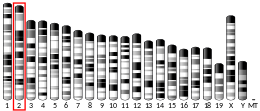Small EDRK-rich factor 2 is a protein that in humans is encoded by the SERF2 gene.[5][6]
References
- 1 2 3 GRCh38: Ensembl release 89: ENSG00000140264 - Ensembl, May 2017
- 1 2 3 GRCm38: Ensembl release 89: ENSMUSG00000074884 - Ensembl, May 2017
- ↑ "Human PubMed Reference:".
- ↑ "Mouse PubMed Reference:".
- ↑ Scharf JM, Endrizzi MG, Wetter A, Huang S, Thompson TG, Zerres K, Dietrich WF, Wirth B, Kunkel LM (September 1998). "Identification of a candidate modifying gene for spinal muscular atrophy by comparative genomics". Nature Genetics. 20 (1): 83–6. doi:10.1038/1753. PMID 9731538.
- ↑ "Entrez Gene: SERF2 small EDRK-rich factor 2".
Further reading
- Bonaldo MF, Lennon G, Soares MB (September 1996). "Normalization and subtraction: two approaches to facilitate gene discovery". Genome Research. 6 (9): 791–806. doi:10.1101/gr.6.9.791. PMID 8889548.
- Faber PW, Barnes GT, Srinidhi J, Chen J, Gusella JF, MacDonald ME (September 1998). "Huntingtin interacts with a family of WW domain proteins". Human Molecular Genetics. 7 (9): 1463–74. doi:10.1093/hmg/7.9.1463. PMID 9700202.
- Zhang QH, Ye M, Wu XY, Ren SX, Zhao M, Zhao CJ, Fu G, Shen Y, Fan HY, Lu G, Zhong M, Xu XR, Han ZG, Zhang JW, Tao J, Huang QH, Zhou J, Hu GX, Gu J, Chen SJ, Chen Z (October 2000). "Cloning and functional analysis of cDNAs with open reading frames for 300 previously undefined genes expressed in CD34+ hematopoietic stem/progenitor cells". Genome Research. 10 (10): 1546–60. doi:10.1101/gr.140200. PMC 310934. PMID 11042152.
- Kim SC, Sprung R, Chen Y, Xu Y, Ball H, Pei J, Cheng T, Kho Y, Xiao H, Xiao L, Grishin NV, White M, Yang XJ, Zhao Y (August 2006). "Substrate and functional diversity of lysine acetylation revealed by a proteomics survey". Molecular Cell. 23 (4): 607–18. doi:10.1016/j.molcel.2006.06.026. PMID 16916647.



